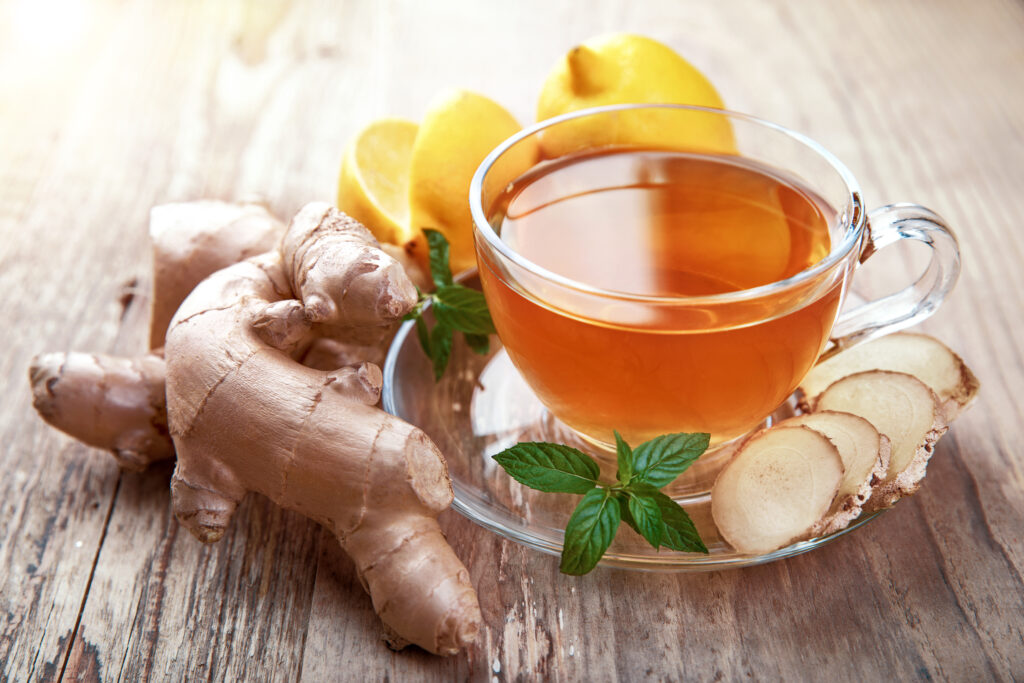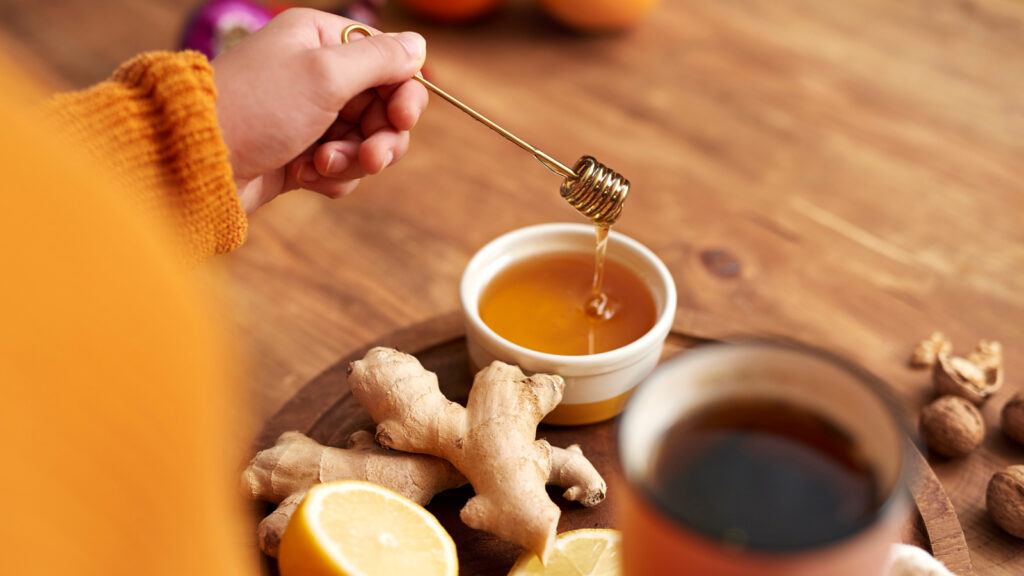Ginger tea is a popular herbal beverage made from fresh ginger root or ginger powder steeped in hot water. It has been enjoyed for centuries and is known for its potential health benefits. Here are some of the benefits of ginger tea:

- Digestive Aid: Ginger tea is renowned for its ability to promote healthy digestion. It can help alleviate indigestion, bloating, and flatulence by stimulating the production of digestive enzymes and increasing motility in the digestive tract.
- Nausea Relief: Ginger tea is often used as a natural remedy for nausea and vomiting, especially during pregnancy or motion sickness. It has been found to be effective in reducing the severity of nausea and improving overall comfort.
- Anti-Inflammatory Properties: Ginger contains bioactive compounds, such as gingerol, that possess anti-inflammatory and antioxidant properties. Regular consumption of ginger tea may help reduce inflammation in the body, potentially benefiting conditions like osteoarthritis and rheumatoid arthritis.
- Immune System Support: The antioxidants present in ginger tea can contribute to a stronger immune system by helping to combat oxidative stress and potentially reducing the risk of infections.
- Pain Relief: Due to its anti-inflammatory effects, ginger tea may provide relief from minor aches and pains, such as headaches and menstrual cramps.
- Weight Management: Some studies suggest that ginger tea may help support weight management by boosting metabolism and aiding in fat oxidation. However, its effects on weight loss are generally modest and should be combined with a healthy diet and regular exercise.
- Heart Health: Ginger tea may have a positive impact on heart health by helping to lower blood pressure and reduce cholesterol levels. These effects contribute to a reduced risk of cardiovascular diseases.
- Improved Blood Circulation: The warming properties of ginger tea can help improve blood circulation, which in turn may promote better oxygen and nutrient delivery to various tissues in the body.
- Respiratory Health: Ginger tea’s anti-inflammatory and antimicrobial properties may help soothe respiratory issues such as coughs, colds, and congestion.
- Stress Relief: The aromatic and soothing nature of ginger tea can have a calming effect, promoting relaxation and stress relief.
- Antioxidant Benefits: Ginger contains various antioxidants that help protect cells from damage caused by free radicals, potentially reducing the risk of chronic diseases and supporting overall health.
It’s important to note that while ginger tea offers many potential benefits, individual responses may vary. Additionally, if you have any preexisting medical conditions or are taking medications, it’s a good idea to consult with a healthcare professional before making significant changes to your diet or incorporating herbal remedies like ginger tea.

How To Prepare Ginger Tea
Preparing ginger tea is a simple and soothing process. Ginger tea is known for its potential health benefits, including aiding digestion and boosting the immune system. Here’s a basic recipe for making ginger tea:
Ingredients:
- Fresh ginger root (about 1-2 inches)
- Water (2-3 cups)
- Honey or lemon (optional)
- Tea bag (optional)
Instructions:
- Prepare the Ginger:
- Wash the ginger root thoroughly to remove any dirt or debris.
- You can peel the ginger if you prefer, although it’s not necessary. Peeling can make the tea slightly milder in flavor.
- Slice, grate, or chop the ginger into thin pieces or small chunks. The more surface area you expose, the stronger the ginger flavor will be.
- Boil the Water:
- Bring 2-3 cups of water to a boil in a pot or kettle.
- Add Ginger:
- Once the water is boiling, add the prepared ginger to the pot.
- Reduce the heat to medium-low and let the ginger simmer in the water for about 10-15 minutes. This will infuse the water with the ginger’s flavor and compounds.
- Optional: Add Tea Bag:
- If you want to make ginger tea with an extra twist of flavor, you can add a tea bag of your choice (black, green, herbal) during the last few minutes of simmering.
- Strain:
- After simmering, use a fine mesh strainer to remove the ginger pieces from the tea. This will ensure you have a smooth, clear tea without any ginger bits.
- Serve and Flavor:
- Pour the ginger-infused tea into cups.
- You can enjoy the ginger tea as it is, or you can add honey or a squeeze of lemon to taste. Honey can provide sweetness and lemon adds a tangy kick.
- Adjust Flavor:
- If you find the ginger flavor too strong, you can dilute the tea with a bit of hot water.
- Conversely, if you prefer a stronger ginger flavor, you can simmer the ginger for a longer period.
- Enjoy:
- Sip and enjoy your freshly prepared ginger tea. It’s a wonderful beverage to have on a chilly day or whenever you need a comforting and revitalizing drink.
Remember, ginger tea can be adjusted to suit your taste preferences. You can experiment with the ginger-to-water ratio and the addition of other ingredients like cinnamon, cloves, or mint. As with any herbal remedy, if you have any specific health concerns or are on medication, it’s a good idea to consult with a healthcare professional before making significant changes to your diet.

